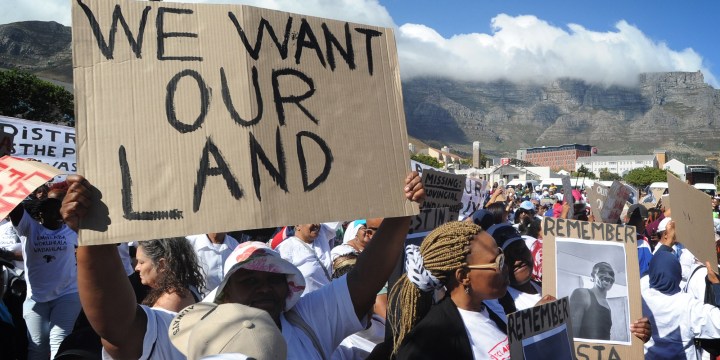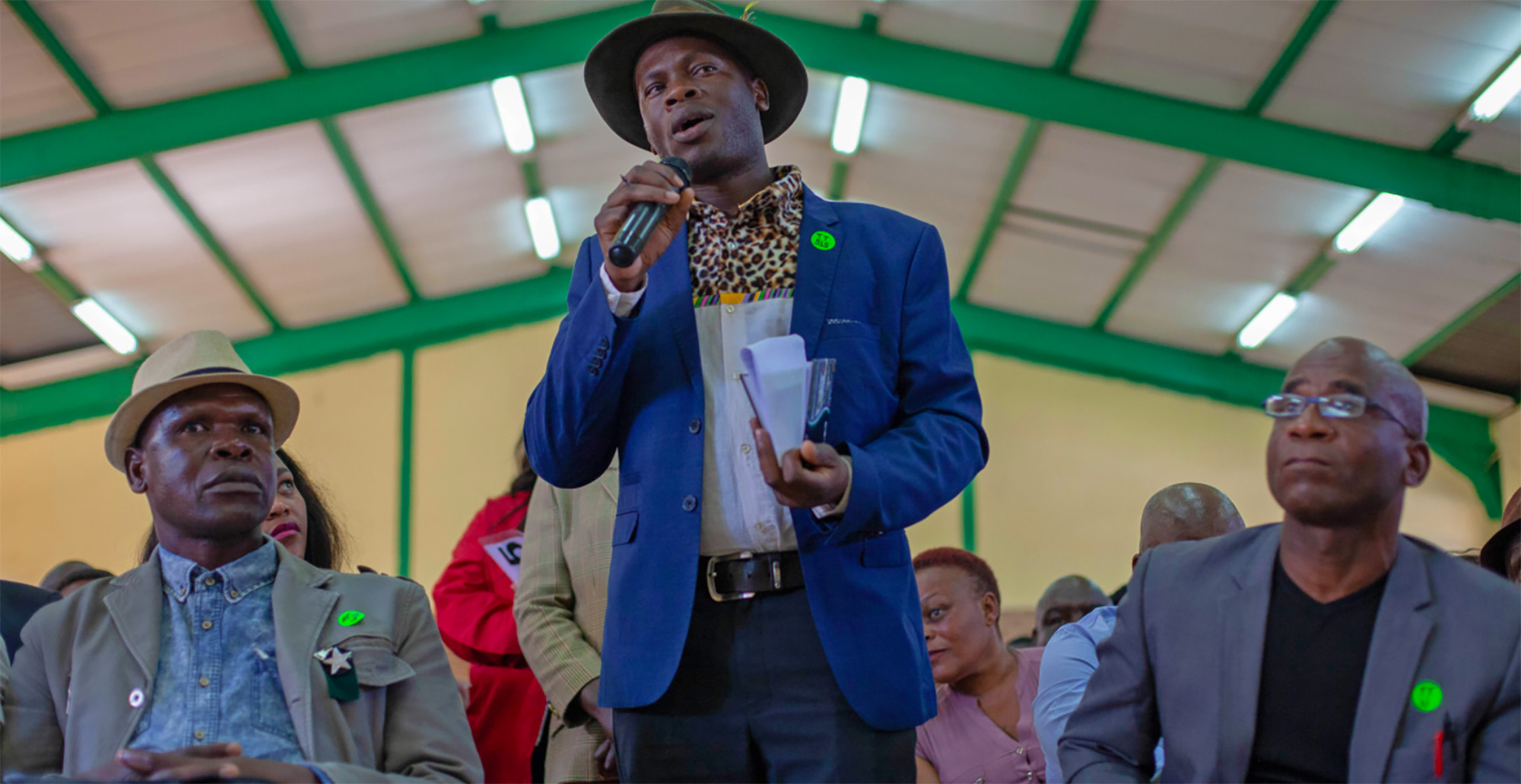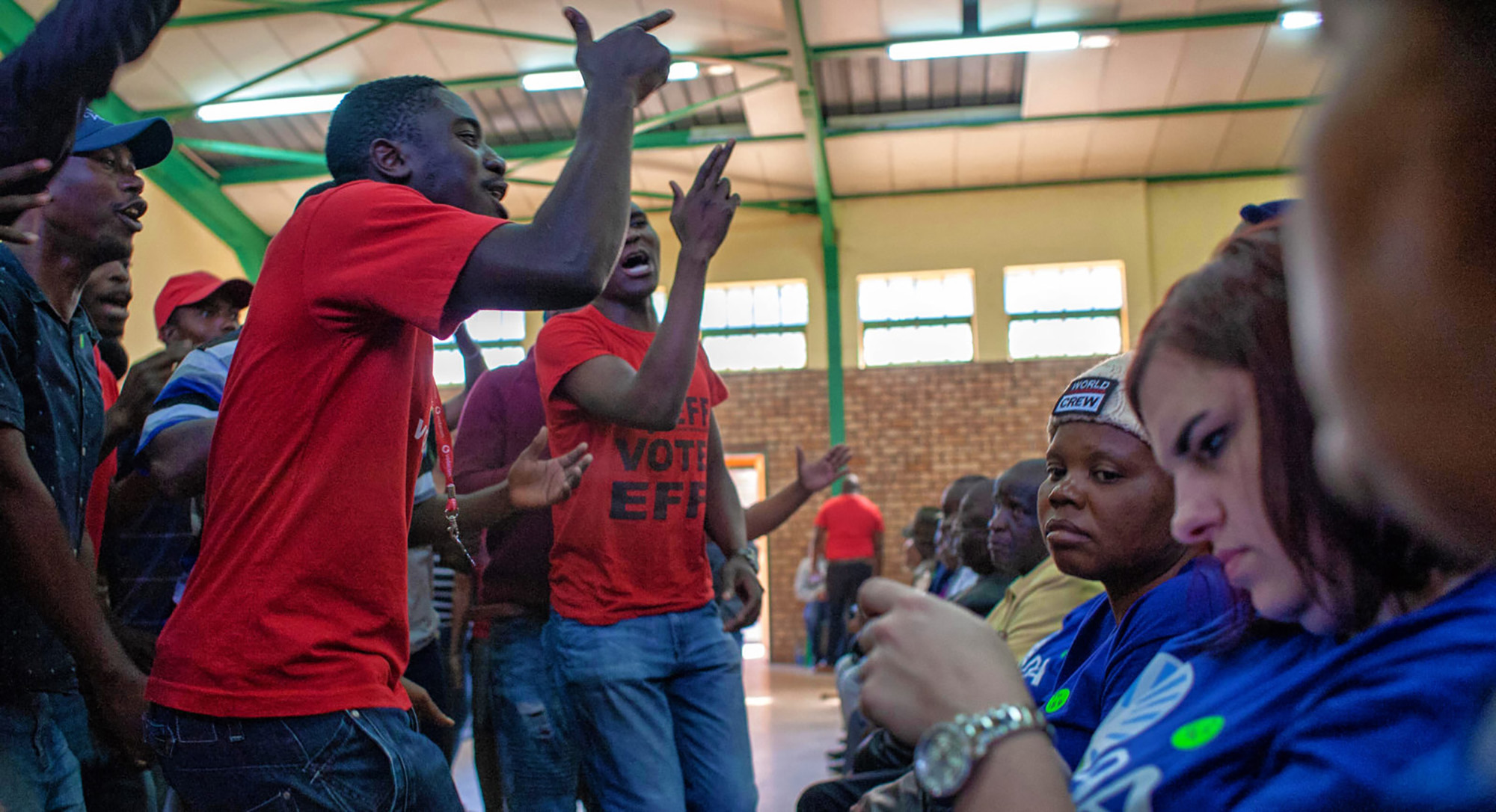PARLIAMENT
Expropriation Bill ends 16-year legislative journey to presidential in-tray

The governing ANC can now take expropriation legislation that allows for ‘nil compensation’, alongside the NHI Bill, on the election campaign trail. While not yet signed into law, both pieces can be used to showcase the party’s delivery on policy promises.
On Wednesday 27 March, the National Assembly – on the back of ANC numbers in the House – approved the Expropriation Bill as amended by the National Council of Provinces (NCOP) with a vote of 205 in favour and 108 against.
It was a short process to get here – a public committee meeting on Tuesday to approve the changes, followed by Wednesday’s vote a day before the National Assembly rises for a constituency period ahead of elections.
This approval vote marks the end of a 16-year journey that began in 2008 to replace the apartheid-era law still on the statute books.
It comes against the backdrop of often heated moments as this legislation became enmeshed in the 2018 to 2021 process to amend the Constitution to allow compensationless expropriation – a process that itself was steeped in ANC factional dynamics pushed by the so-called “radical economic transformation” grouping.

A man speaks against changing the Constitution to allow for expropriation without compensation at the Section 25 hearings in Limpopo, South Africa on 28 June 2018. (Greg Nicolson)
The National Health Insurance (NHI) Bill had a similarly controversial passage through Parliament, with last-minute calls from organised business for President Cyril Ramaphosa to refer the legislation back to Parliament over constitutional concerns.
The NHI Bill was passed in December 2023, and, like the expropriation legislation, could still head to court.
Threats of litigation
The DA, Freedom Front Plus and IFP want the President to refer the Expropriation Bill back to Parliament or to the Constitutional Court for a decision on its constitutionality.
The EFF said the Bill would “protect the current landholders – the settlers and colonialists”, while the ACDP also spoke against it.
IFP MP Sanele Zondo pointed to irregularities in obtaining provincial mandates in the NCOP, adding that while the IFP supported meaningful land reform as a part of transformation, this legislation was not it.
FF+ MP Philip van Staden said there was enough land available for redistribution, but that government red tape and incompetence were a stumbling block.
DA MP Isaac Seitlholo said the legislation was “expropriation through the backdoor” packaged as land reform, and would be opposed – as a first step – with a letter to the President not to sign the law into force.
The ANC, in its declarations in the House, supported the Expropriation Bill, saying it was based on best international practice.
ANC MP Timothy Mashele said it was a “balanced perspective” and would ensure fair processes.
Passing the Bill “should happen as a matter of yesterday”, he said, adding that people were waiting for land to be expropriated so government could build houses and health facilities
Much like the ANC speakers, a statement by trade union federation Cosatu welcomed the passage of the expropriation legislation as a “historic victory for the working class, the dispossessed and the downtrodden” – and a tool to accelerate land reform.
‘Nil compensation’
The Expropriation Bill, the third iteration of this legislation since 2008, allows expropriation for public purpose in the public interest and allows for “nil compensation” in a handful of categories, including land held for speculation, abandoned land and state land.
“The parliamentary legal adviser recorded that the amendments indeed did not render the Bill unconstitutional or procedurally flawed,” said the public works committee report adopted on Tuesday.
“The majority of the committee was convinced that the amended Bill puts in place uniform administrative procedures that are compliant with the constitutionally protected rights of owners and holders of rights.”
This is a far cry from the often heated discussion when, in 2008, the first version of the Bill was withdrawn after parliamentary legal advisers pointed out that not allowing recourse to the courts was unconstitutional.
Read more in Daily Maverick: Contested Expropriation Bill closer to becoming law, but don’t hold your breath

EFF supporters sing in front of DA supporters in Limpopo, South Africa at hearings on changing Section 25 of the Constitution to allow for land expropriation without compensation on 28 June 2018. (Photo: Greg Nicolson)
It took until 2015 to reintroduce a revised version. It was passed, but in 2017, then president Jacob Zuma returned it to Parliament over concerns about a lack of public consultations.
Ultimately, the Bill was withdrawn amid political jockeying ahead of the 2017 ANC national elective conference at Nasrec, which at the last minute adopted compensationless expropriation without endangering food security or economic activity.
Between 2018 and late 2021, calls for a constitutional review of S25 of the Constitution – the property clause – to make explicit compensationless expropriation dominated.
In public hearings, expropriation without compensation emerged as shorthand for social justice.
But the toenadering between the ANC and EFF shattered in late 2021, and that meant the required two-thirds majority needed for a constitutional amendment was out of reach when the vote was held on 7 December 2021.
The focus returned to the Expropriation Bill and it was adopted on 28 September 2022 on the back of ANC numbers.
Read more in Daily Maverick: ANC declaration on land highlights RET retreat, but offers few solid solutions
The current version of the expropriation legislation was introduced in Parliament in October 2020, allowing “nil compensation” in the expropriation of, among other categories, state land, abandoned land or land held for speculation.
The NCOP process was completed by December 2023 but then delayed repeatedly in order to obtain provincial mandates. It was finally adopted with the support of all provinces except the DA-run Western Cape on 19 March 2024.
Wednesday’s adoption of the NCOP-amended Expropriation Bill means it will now go straight to the presidential in-tray for signature on to South Africa’s statute books. DM


















 Become an Insider
Become an Insider
The ANC are masters at ensuring their re-election. However, they are duffers at governing the country
The ANC are masters at ensuring their re-election. However, they are duffers at governing the country
Just hope that the populace has now enough wisdom through their lived experience the spot an empty promise, even if borne out of a noble course. Playing on people’s emotions.
Also hope there’s enough critical thinking to spot an unimplementable policy, at least unlikely to succeed even if it becomes law. Yes equity of opportunity is right. But we need a pragmatic way, backed by resources.
Having said that, I don’t advocate for blaming voters and calling them stupid. There’s a reason they are easy to manipulate or have given up. Any serious opposition party should’ve come to grips with that and tried to beat the ANC at its game. Can’t blame voters for being bad at your job. Blaming voters risks the Trump effect. People dig their heels in.
I have a question for the ANC. If you view Israel’s stealing of Palestinian land as wrong, how can you view the stealing of land in South Africa as right?
Please, no “historical” ownership nonsense, legal ownership is the issue. If you legally own something and it’s taken, without your consent, and you receive nothing, that’s stealing – cut and dry.
The unemployed masses deserve better than acts designed to drive away employers. If privately owned land is needed, make it clear a deal has to be done, but make a fair offer and sweeten the deal. Maybe offer tax incentives. I’m not a financial guru, but surely the ANC employs at least one.
We don’t want South Africa turning into South Zimbabwe.
By this analogy then, if I steal your car, can I claim ‘historic’ ownership and demand tax-payer payment for its return to you?
You cannot sell stolen property, even if the law was the mechanism of the theft.
And on what basis do you ground your statement “you cannot sell stolen property”? From whom and by whom was it stolen? Your analogy of stealing a car is, well, ludicrous in logic. Its thinking like this that perpetuates the narrative that previously disadvantaged people are not capable of greater things, but need to be handed it to them. It diminishes everyone of colour to second class citizens. I on the other hand believe that everyone regardless of colour or creed can be great. But it takes hard work, forgetting the past, a positive attitude and belief in yourself that you will succeed and not accept free hand outs by a government that wants you to be beholden to them.
Stop blaming everyone and everything else, take ownership of your life. Contribute to your family, community and country and discussions like this will become a distant memory.
Receiving stolen property is a crime. In cases where the buyer bought in good faith, he will at least be required to return the goods.
You incline to far the other way in your arguments. If an injustice was done that altered what a person or family might have accomplished if left to their own devices, then isn’t there an argument for compensation, or at least restoring their position to what it was before the injustice was done?
Is there a special case when this happened because of an intervention by the State against it’s own citizens?
you again incline too far to the other way in your argument. How far back generationally do you intend to go with the injustice done? 2 generations, 3 generations, 4 generations? Or should we go back even further, when the African tribes of the north moved into the South of Africa, killing an appropriating land…how far…. Who truly has an original claim to the land…
What I am trying to get to is, our future lies within us. We can be better by focus and hard work.
To quote Cape Flats “the law was the mechanism of the theft.” Now to regain the land, the mechanism asked for is money, from people who don’t have it, generational poverty due to dispossession likely to be the reason put forward for the lack of money to buy what they were not compensated for to begin with. You can see why some would want the no compensation form of correction for the initial misdeed.
The last time I checked commercial land, occupied and land in use were protected, huge swathes of unused land was the issue, you can imagine land lying idle whilst the country imports food and young aspiring farmers are wasted by landlessness, the government must just do away with informal settlements acquired through illegal invasions.
I still have a smile on my face
I don’t think you read my post properly or understood it properly
I started laughing at “if I steal your car”
Have you tried Uber?
The ANC supports land expropriation as best international practice…… what an earth do they mean!
Most countries do have laws by which there can be expropriation, and not always with compensation. Otherwise you could hardly ever get a highway or railway built. Obviously expropriation has to be on the basis of a court ruling made after a proper process of negotiation.
Any land any tribe occupied before there was a South Africa, was land that had taken violently from another.
To give that land back to that is is to legitimise the way they acquired it.
If it was right that black people do it, then it was right that white people do it.
If is a theft of land, then the other too is a theft of land
ANC MP Timothy Mashele said it was a “balanced perspective” and “people were waiting for land to be expropriated so government could build houses and health facilities”.
Good luck to the people waiting for this windfall from the ANC. Building costs money.
Existing health facilities are in a dire state and affordable housing in a joke with corruption and the building mafia. Sadly too, the “abandoned and state land” they talk about has already been happily claimed by informal shack dwellers which makes that part of land expropriation act redundant.
Bob F – March 28th 2024 at 15;00
I have always maintained that South Africa would go the same way as Zimbabwe did under Mugabe, but I really did not believe Ramaphosa would be the one to lead us to destruction. It has just taken a little longer than I anticipatedm
Bob F – March 28th 2024 at 15:15
Robert Mugabe again. The voting public did not expect a man of Ramaphosa’s standing to destroy South Africa in the same way that Mugabe destroyed Zimbabwe.
Well what’s done is done. Suppose it’s too late to say get rid of Ramaphosa. On the other hand would things be any different under any other ANC president)
osa
ugab
Without “settlers and colonialists” there would not be a Republic of South Africa, so accept it or go back to tribalism. Looks Like “the People” want to go back to mud huts, for the poor, but leave the “Leaders” in their Mercedes.
“Please, no “historical” ownership nonsense, ”
In a normal situation, each person has two parents, 4 grandparents, 8 great-grandparents, 16 great-great-grandparents. So taking only those generations into account, each person would be a descendant of 2 + 4 + 8 + 16 = 30 (thirty) people. If any one of them legitimately acquired land, let’s say, would it now belong to you personally?
The other side of the equation…
The average birth rate per woman in Africa is 6. Let’s be a bit more conservative and let’s say 4 per woman and therefore 2 per spouse (not including Zuma here). Your 16-great-great-grandparents would have produced 16 x 2 = 32 people (your great-grandparent’s generation), who would have produced 32 x 2 = 64 people (your grandparent’s generation), who would have produced 64 x 2 = 128 people (your parent’s generation) of whom you and your sibling would be descendants 128 x 2 = 256 – your generation). So taking the first point into account, if one of your 16 great-great-grandparents owned a piece of land, which one of the 256 descendants would now be entitled to it? … never going to work.